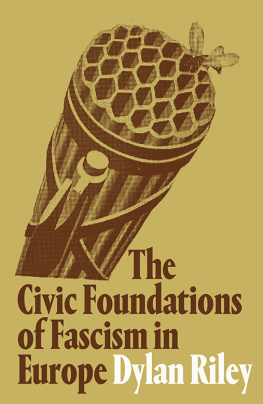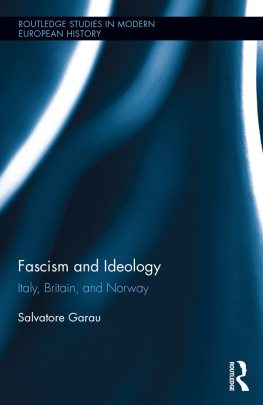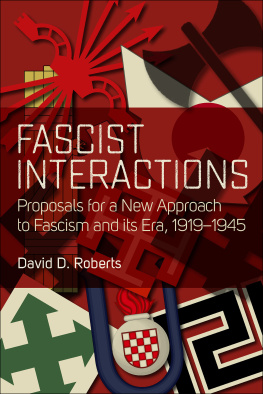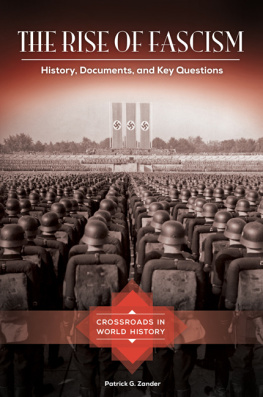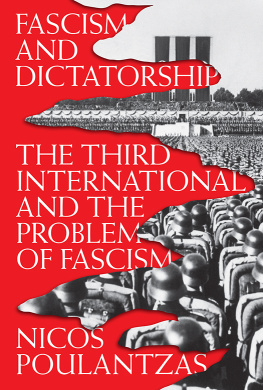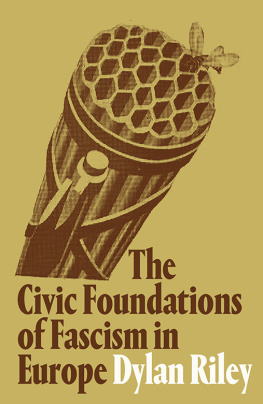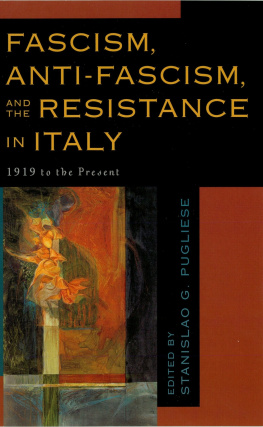Contents

The
Civic Foundations
of Fascism
in Europe
The
Civic Foundations
of Fascism
in Europe
Italy, Spain, and Romania, 18701945
Dylan Riley

This paperback edition published by Verso 2019
First published by The Johns Hopkins University Press 2010
2010 The Johns Hopkins University Press
Dylan Riley 2019
All rights reserved
The moral rights of the author have been asserted
1 3 5 7 9 10 8 6 4 2
Verso
UK: 6 Meard Street, London W1F 0EG
US: 20 Jay Street, Suite 1010, Brooklyn, NY 11201
versobooks.com
Verso is the imprint of New Left Books
ISBN-13: 978-1-78663-523-5
ISBN-13: 978-1-78663-524-2 (UK EBK)
ISBN-13: 978-1-78663-525-9 (US EBK)
British Library Cataloguing in Publication Data
A catalogue record for this book is available from the British Library
The Library of Congress Has Cataloged the Hardback Edition As Follows:
Riley, Dylan J., 1971
The civic foundations of fascism in Europe : Italy, Spain, and Romania, 18701945 / Dylan Riley.
p. cm.
Includes bibliographical references and index.
ISBN-13: 978-0-8018-9427-5 (hardcover : alk. paper)
ISBN-10: 0-8018-9427-1 (hardcover : alk. paper)
1. FascismEuropeHistory19th century. 2. FascismEurope History20th century. 3. Europe Politics and government 19th century. 4. EuropePolitics and government20th century. I. Title.
d726.5.R48 2010
320.53'3094dc22 2009020309
Printed in the us by Maple Press
Ad Emanuela con amore
Contents
This book grew out of my studies at UCLA and has consumed much of my life for the past ten years. But its core idea has a more precise origin: a warm August day in 2001 in the foothills of the Italian Alps in a small town called Torre Pellice. There, in a sunlit room with no books and only a laptop, it struck me that fascism had developed precisely in the dense, culturally rich, and politically sophisticated zones of north-central Italy. These were the same regions in which the seeds of modern civilization, especially the idea of popular sovereignty, had been preserved and then reborn in the fifteenth and sixteenth centuries. Further, it was here that dense webs of cooperative societies, chambers of labor, and mutual aid societies had developed in the early twentieth century. Was there any connection between these facts? Did fascism grow from a civic soil? This question immediately raised others. What was the real nature of fascism? To what extent were fascist movements antidemocratic, as they are widely presented in both historical and sociological accounts? How should fascism be understood comparatively? These questions have occupied at least some of my waking hours, and sometimes all of them, every day since.
I have incurred many debts in the process of writing this book. I would like to thank my extraordinarily patient, helpful, and supportive advisers: Perry Anderson, Rebecca Jean Emigh, Carlo Ginzburg, and Michael Mann. Each contributed in both obvious and subtle ways to the books conception. All of them read and commented on parts or all of the book.
I also thank Victoria Bonnell, who has been an unfailingly supportive faculty mentor and who encouraged me to make a crucial reorganization of the book and extend the analysis to Eastern Europe. This helped immensely in framing my comparative approach. I am grateful to Giovanni Arrighi, Irene Bloemraad, Michael Burawoy, Georgi Derlugian, Peter Evans, Neil Fligstein, Marion Fourcade, Paul Ginsborg, Marco Santoro, Sandra Smith, Cihan Tugal, and Zulema Valdez, who all commented on various drafts of the project. I owe an enormous debt to the staff of the Fondazione Ugo Spirito in Rome for their wonderful combination of warmth and professionalism. My book benefited substantially from the work of three outstanding research assistants: Ryan Calder, Juan Fernandez, and Nicholas Hoover Wilson. My son, Eamon, was patient enough to let me finish the book, and for this he richly deserves his Lego set. Finally, I thank my wife, Emanuela Tallo, who has been unfailingly supportive and loving during the writing of this book and who has taught me an enormous amount about her own amazing country. It is to her that I dedicate the work.
I have been fortunate to be able to present pieces of my argument to a variety of audiences. I thank audiences at the Johns Hopkins University, the Central European University, UCLA, and UC Davis for challenging me and forcing me to think more clearly about my ideas. I would also like to thank my students at UC Berkeley, especially those in my comparative and historical methods seminar, whose relentless critical intelligence has often prompted me to reformulate and rethink my approach to historical sociology.
Research for this book was supported by a Fulbright grant from the Institute for International Education. In addition, the University of California at Berkeleys Institute for East European and Eurasian Societies, Institute for European Studies, Institute for Industrial Relations, and Committee on Research all provided financial support for the project.
aA | agrarpolitisch Apparat |
ACNP | Asociacin Catlica Nacional de Propagandistas |
ACS | Archivio Centrale dello Stato, Rome |
AF | Archivi fascisti |
AfA | Allgemeine frei Angestelltenbund |
ANI | Associazione Nazionalista Italiana |
CDI | Centralverband Deutscher Industrieller |
CEDA | Confederacin Espaola de Derechas Autnomas |
CGL | Confederazione Generale del Lavoro |
CGT | Confederacin General del Trabajo |
CNCA | Confederacin Nacional Catlico Agraria |
CNT | Confederacin National del Trabajo |
DAF | Deutsch Arbeitsfront |
DC | Democrazia Cristiana |
DDP | Deutsch Demokratische Partei |
DGPS | Direzione generale pubblica sicurezza |
DN | Direttorio nazionale |
DNVP | Deutschnationale Volkspartei |
DVP | Deutsche Volkspartei |
ME | bred Magyarok Egyeslete |
EOA | Ente Opera Assistenziali |
ERC | Esquerra Republicana de Catalunya |
FET | Falange Espaola Tradicionalista |
FET-JONS | Falange Espaola Tradicionalista y de las Juntas de Ofensiva Nacional-Sindicalista |
FIOM | Federazione Italiana Operai Metallurgici |
FISA | Federazione Italiana dei Sindacati degli Agricoltori |
FNR | Frontul Renaterii Naionale |
FNTT | Federacin Nacional de Trabajadores de la Tierra |
GdA | Gewerkshaftsbund der Angestellten |
Gedag | Gesamtsverband Deutscher Angestelltenwerkshaft |

